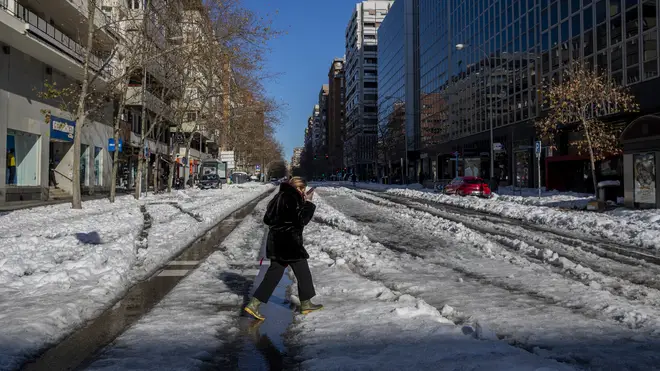
Ali Miraj 12pm - 3pm
12 January 2021, 14:54

Streets and roads turned into dangerous ice sheets in areas not used to extreme winters.
Much of Spain is struggling to return to normality three days after a 30-hour-long record snowfall that was then hardened by record-low temperatures.
Overnight temperatures were the coldest since at least 2001 and dropped in some places to the lowest since 1982, according to the Spanish weather agency AEMET.
Eleven of Spain’s 51 provinces and autonomous regions were in the highest weather alert level.
Schools remained closed in Madrid and much of central Spain, with emergency and military crews still working to reopen roads, remove fallen trees, re-establish power lines, as well as ensuring the distribution of food and coronavirus vaccine.
Authorities are urging people to stay at home unless they really need to go out, to avoid accidents that could further strain emergency rooms.

A military hospital in the capital had already seen a worrying uptick in trauma cases, defence minister Margarita Robles said late on Monday.
Visiting the operation centre of a military emergency unit, Spanish Prime Minister Spanish Pedro Sanchez thanked civil protection crews and soldiers.
“We have had to live difficult and complex times, but we will move forward because the Spanish society does not give up in the face of adversity,” he said in televised comments.
The town of Bello, in the north-eastern Teruel province, registered a temperature of minus 25.4C (minus 13.7F), while Molina de Aragon, in the central Guadalajara province, was only a tenth of a degree warmer.
In Madrid and the badly hit surrounding region, home to 6.6 million people, thermometers plummeted up to minus 16C overnight, although a sunny day gave respite to people trying to get to work and crews cleaning up ice and debris from streets.
In a preliminary assessment, the city hall estimated that at least 150,000 of Madrid’s 800,000 trees have fallen due to the weight of snow.

The capital’s airport, the busiest in the country, was expected to get back to full operation on Tuesday, and railway operations were steadily increasing in frequency.
Madrid’s main retail market also re-opened Tuesday for the first time since Friday, leading to a frantic activity of trucks and vans coming in and out to stock up the aisles of supermarkets that had seen shortages of fresh produce.
Storm Filomena left up to 20 inches of snow across large swaths of Spain starting on Friday morning.
Five people, including two homeless people in Barcelona, died as a result of the blizzard and the ensuing cold snap, the government reported.
The Madrid regional government said Tuesday it was still waiting for a new batch of Pfizer-BioNTech vaccines against the coronavirus that had been due to arrive the day before by plane but had to be diverted to a northern Spanish airport.
The regional health department told The Associated Press that the delay was not expected to affect the local vaccine drive, which continued at nursing homes and among health personnel with doses delivered earlier.